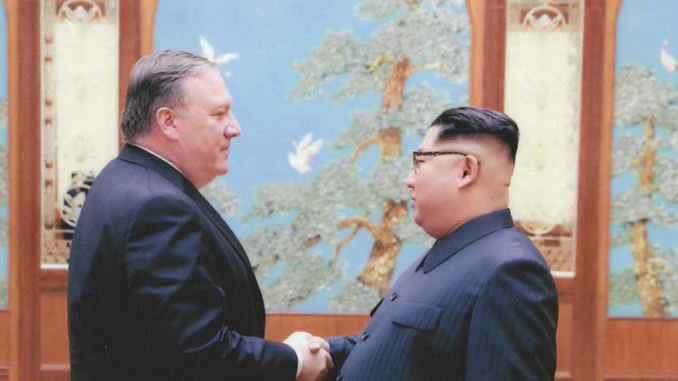
“Regardless of the DPRK’s ultimate aims, negotiations will be difficult and slow at best,” a July 1997 background paper advised U.S. negotiators. North Korea’s having indefinitely postponed high-level talks with South Korea, while warning that it could pull out of the scheduled June 12 summit between President Trump and its leader Kim Jong-un in Singapore, highlights the perils that could lie ahead even as the diplomacy is just getting started.
On CBS’s “Face the Nation” on Sunday, U.S. Secretary of State Mike Pompeo told the show’s host Margaret Brennan that the United States seeks “total denuclearization” of North Korea in exchange for full economic engagement with the United States. “Our ask is complete and total denuclearization of North Korea,” the Secretary of State explained. “[I]f we get denuclearization, of course there will be sanctions relief, certainly, “he continued. “There will be more than that.” At the same time, the Secretary of State added, “There is still a lot of work to do.”
North Korea’s tactical withdrawal from high-level talks with South Korea and its threat to withdraw from the upcoming bilateral U.S.-North Korea summit likely represent an early attempt to probe American responsiveness to pressure. Such tactics likely won’t derail the summit.
Out of the public view, preparation for the summit is very likely continuing. Details concerning negotiating strategies and positions won’t be made public. Doing so would invite posturing and other tests of strength that could doom the negotiations.
The partially declassified July 1997 background paper cited above is useful for providing insight, as the basic issues at the heart of the North Korea-South Korea conflict, including the fate of North Korea’s nuclear program, remain essentially unchanged from where they were in 1997.
The paper explained that the issues “can be divided into the legal aspects of a peace treaty and the Armistice, political agreements, military confidence building measures, and economic elements.” The economic elements would include sanctions relief, investment, trade, and foreign assistance (humanitarian and non-humanitarian).
At that time, North Korea was expected to bargain hard for up-front returns on its diplomatic efforts. Little has changed since then to suggest a fundamentally different course. The Secretary of State appeared to rule out early benefits for North Korea in his linking sanctions relief to “complete and total denuclearization.” Such a position is much tougher than one that would tie sanctions relief to the countries’ reaching an agreement to denuclearize and/or their achieving intermediate targets toward denuclearization.
The paper continued, “DPRK priorities will be to maximize economic assistance and investment… while minimizing its military concessions.” Considering the current state of North Korea’s economy, North Korea will very likely push for phased sanctions relief. Accommodating North Korea’s position likely would not be constructive. The 1997 paper observed that North Korea had, in the past, “leaned heavily on sweeping promises that later can be ignored.”
Should the summit take place, an early “test” could arise based on one of President Trump’s previous tweets. On March 8, the President tweeted:
Kim Jong Un talked about denuclearization with the South Korean Representatives, not just a freeze. Also, no missile testing by North Korea during this period of time. Great progress being made but sanctions will remain until an agreement is reached. Meeting being planned!
— Donald J. Trump (@realDonaldTrump) March 9, 2018
That tweet takes a position much closer to North Korea’s traditional posture than the Secretary of State’s description of U.S. aims. The President will probably follow his Secretary of State’s advice, but the existence of the tweet could still lead to North Korea’s testing the U.S. stance on that basic issue.
The 1997 paper also advised against linking denuclearization to the separate matter of North Korea-South Korea reconciliation. Such linkage could allow North Korea to drive a wedge between the U.S. and South Korean governments by appealing to the desires of South Korea’s population for a rapid relaxation of tensions. Such appeals, if effective, could create pressure on American and South Korean negotiators to rush toward an agreement that could wind up being deeply flawed. Linking the two issues could also open the door for North Korea to inject previous positions related to withdrawal of American troops from South Korea into the talks. It could even lead North Korea to demand a reunification framework that would lead to the possibility of the reunified country’s being governed by the North’s leadership or a fragile power-sharing arrangement that Pyongyang could later exploit.
Finally and perhaps most importantly, the paper advised that the United States should be “prepared for the long haul and keep expectations low.” North Korea’s tactics this week reinforce the value of that advice.
